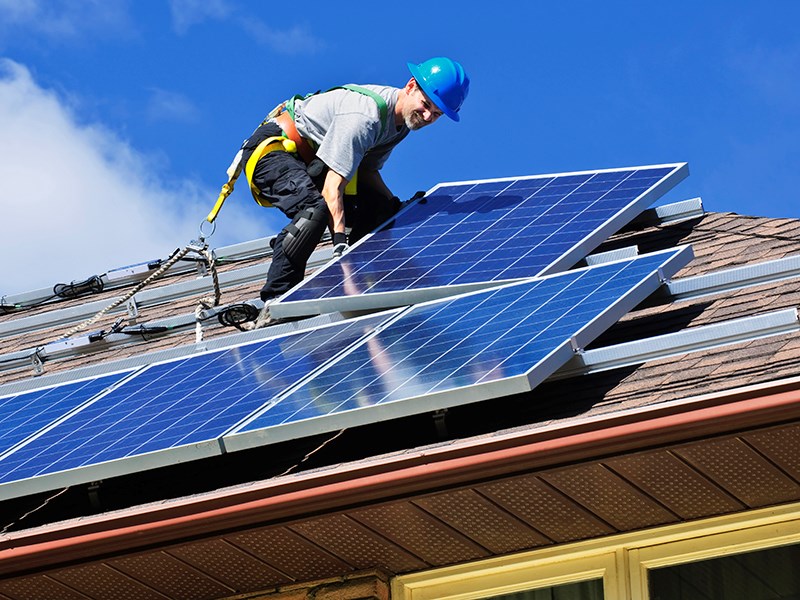Powell River’s solar panel market is heating up outside of city limits from those looking to go off the grid, but so far demand is not coming from residents within the city.
“We don’t see a lot of people adding solar to their houses in the city,” said local architectural designer and project manager CaroleAnn Leishman, also a City of Powell River councillor.
Demand is coming from the number of people who own recreational property around Powell River’s lakes and islands, or those who own property in areas not serviced by BC Hydro’s power grid, said Powell River solar panel designer and installer Ryan Albury.
For Albury’s company, the majority of the jobs it takes are for people living on Savary Island or other places not serviced by the grid, he said. He has been working in the industry for the past six years and has taken jobs all over the coast.
Solar panel systems capture the sun’s energy using photovoltaic cells. They do not need direct sunlight to work and electricity generated can be converted to power household lights and appliances. Systems are added to houses already connected to grid power and can act as emergency backup power.
Systems are also installed on homes not connected to the grid and can be used, in conjunction with battery banks and generators, to supply the home’s power.
Only about 400 BC Hydro customers in the province have signed up for the public utility’s net-metering program, allowing customers to put power back on the grid during times of low need.
Few of the newly constructed homes being built in Powell River include solar panels in their designs, said Leishman.
That situation is changing on Vancouver Island, she explained, where local governments, such as Town of Comox, are requiring companies to build to third-party green certificate standards. Some of the provisions include framing houses so they are ready to be set up with solar panels.
Leishman said she supports the idea of municipal governments taking a larger role in encouraging contractors to build to higher environmental standards.
The number of companies designing and selling solar panel installations in Powell River has grown recently, including a company owned by Powell River businessperson and mayor Dave Formosa that specializes in outfitting recreational vehicles and cabins with solar power. Albury said he knows of four other companies locally that do installations.
In talking with his clients, Albury said there are a number of reasons people choose to put the panels up, environmental being primary.
“The whole green movement is a pretty big one for people,” he said. “Reduction is always the way to help the environment, if that’s what you’re trying to do.”
Similar to early adopters of electric vehicles, up to now solar power has been a niche market for only the wealthiest Canadians. Like all early adopters who bear the higher costs, the market does adapt and prices come down.
In 1998, installed household solar panels cost $11 per watt, but by last year the amount had dropped to between $3.50 and $4 per watt, according to BC Sustainable Energy Association (BCSEA).
“When I first started a 175-watt solar panel would cost $1,500,” said Albury. “Now you can get a 250-watt solar panel for $250.”
Despite dropping costs, the technology still has not found mainstream appeal because of its initial setup costs. According to the BCSEA, a solar-panel system that could provide almost half of a typical house’s power needs, about 10,000 kilowatt hours of electricity annually, costs about $16,000. With energy savings of roughly $550 per year, it could take more than 15 years, with rising electricity costs, for the system to pay for itself.
That dilemma is something Leishman, as a city politician, wants to tackle. “I would love to put a program together where we can loan money to homeowners to do energy-efficiency upgrades to the home,” she said.
Instead of the loan being with the homeowner, the loan stays with the property and is paid back over a number of years, said Leishman.
Over the lifetime of the house these energy-efficiency measures pay off, she added.
While there has been active discussion on the idea going back as far as 2004, the BC government has not moved to make the changes. Nova Scotia has though. Between March 2013 and February 2015, City of Halifax ran an $8.3 million solar hot water pilot program with 300 homes in the city. That program netted the city a 10,500-tonne reduction in carbon.
“They found homeowners were breaking even, saving on their utility bills, so the loan was a wash,” said Leishman. “It makes perfect sense.”
Leishman said she and other Powell River councillors made that point to the province when they were asking for comments on their climate leadership plan this winter.
“We’re hoping they will change that legislation specifically,” she said, “so we’ll be able to do that.”



